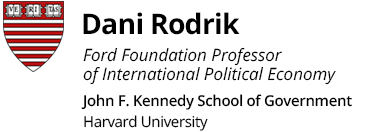Reimagining the Economy Program, an initiative led by Professors Gordon Hanson and Dani Rodrik
|
|
Dani Rodrik is an economist whose research revolves around globalization, economic growth and development, and political economy. His current work focuses on how to create more inclusive economies, in developed and developing societies. Rodrik is the Ford Foundation Professor of International Political Economy at Harvard's John F. Kennedy School of Government. He is co-director of the Reimagining the Economy Program at the Kennedy School and of the Economics for Inclusive Prosperity network. He was President of the International Economic Association during 2021-23 and helped found the IEA's Women in Leadership in Economics (IEA-WE) initiative. His most recent books are Combating Inequality: Rethinking Government's Role (2021, edited with Olivier Blanchard) and Straight Talk on Trade: Ideas for a Sane World Economy (2017). |

















